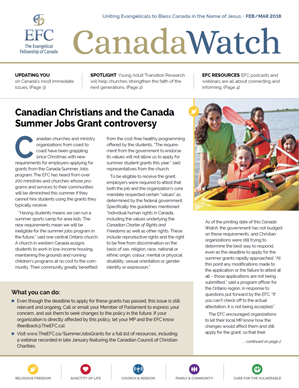 As a member of the EFC community, you are more than aware of the challenges facing religious freedom in Canada recently. We asked Bruce J. Clemenger, president of the EFC, to dig into the issues for us.
As a member of the EFC community, you are more than aware of the challenges facing religious freedom in Canada recently. We asked Bruce J. Clemenger, president of the EFC, to dig into the issues for us.
CW: Have there been an unusual number of challenges to religious freedom in Canada recently?
BC: A number of religious liberty issues have made headlines in the last year. The Canada Summer Jobs grant program has captured our attention and significant concern. It is impacting hundreds of evangelical churches and organizations across the country. There has been the proposed law school at Trinity Western University and the EFC’s supportive Supreme Court of Canada intervention in December. There was the Quebec government’s attempt to refuse public services to people wearing face coverings, and, of course the rules in Ontario that require effective referrals be given to patients requesting euthanasia and other procedures even when they go against the conscience of the medical professional.
CW: More people in our society seem to be advocating that the state has to be neutral, and that somehow this means treating religious groups differently. What does neutrality actually mean?
BC: In public policy the historic Canadian approach to government neutrality has meant government needs to act in a fair way. When this is happening well, the government does not play favourites and treats every group and person the same. When it comes to funding, and we can think about this in terms of the Canada Summer Jobs grant controversy, the government would be acting with an indifference to whatever faith is held and practised by the group they are working with. The focus would be on the activities being funded, not the beliefs and values of the group that is contributing to the public good.
CW: Have we seen this before in Canada, this barring of government funding for faith-based organizations?
BC: Historically, there has not been a barrier to government funding for programs of faith-based organizations in Canada. When the state is successfully implementing the fairness approach to neutrality for the public good, it funds projects that benefit all and works with organizations regardless of whether they are Christian, humanist, atheist or holding some other world view.
CW: So what is actually happening, in the big picture, with situations like the Canada Summer Jobs grants?
BC: There seems to be a new approach emerging which we can call selective neutrality. You can guess that this means some religious organizations benefit from the government’s favour, while others do not. A benefit is withheld, as we are witnessing with the Canada Summer Jobs grant situation, if the organization does not affirm and align with a set of rights and “Charter values” – think of the required attestation we have been talking so much about. We keep pointing out, over and over again, that the “other rights” and “Charter values” mentioned have not actually been identified or confirmed by any court or by Parliament.
CW: So what exactly are Charter values?
BC: Well, there is no official list and they are not legally defined. They are never actually mentioned in the Charter itself, but they are often invoked to defend a certain interpretation of the Charter and the freedoms and rights it protects. These undefined values are being used to determine when freedoms can be restricted, and to make broad interpretations of what is in the public interest. When we lose the idea that the Charter exists to protect all Canadians from government activity that may violate our freedoms and rights, we lose something incredibly important. These issues go deep. They are about more than the accreditation of a law school or a church receiving a grant to hire summer students. This is about what it means to live in a liberal democracy and how our governments treat us – particularly those of us with minority views.
What you can do
- Continue to interact with your MPs on the specific issue of the Canada Summer Jobs grant situation, and the overarching issue of how we define state neutrality and religious freedom in Canada.
- Check www.TheEFC.ca regularly for updates on these issues.
- Ask your local church if they’ve been impacted by the changes to the CSJ issue, and see if you can help out with their summer programs!
Also in this issue: Spotlight on gathering leaders together through Ministry Services; Latest webinar and podcast resources for you; Updating you on Canada’s most immediate issues; Message from the president; Canada Summer Jobs grant work continues; Warm words from donors; And more.